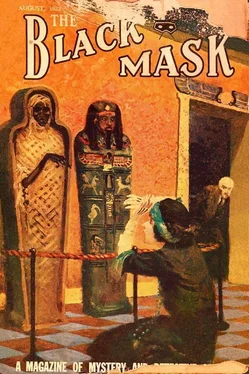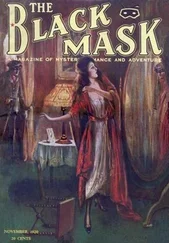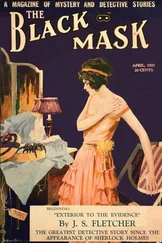John Baer - The Black Mask Magazine (Vol. 5, No. 5 — August 1922)
Здесь есть возможность читать онлайн «John Baer - The Black Mask Magazine (Vol. 5, No. 5 — August 1922)» весь текст электронной книги совершенно бесплатно (целиком полную версию без сокращений). В некоторых случаях можно слушать аудио, скачать через торрент в формате fb2 и присутствует краткое содержание. Город: New York, Год выпуска: 1922, Издательство: Pro-Distributors Publishing Company, Жанр: Детектив, на английском языке. Описание произведения, (предисловие) а так же отзывы посетителей доступны на портале библиотеки ЛибКат.
- Название:The Black Mask Magazine (Vol. 5, No. 5 — August 1922)
- Автор:
- Издательство:Pro-Distributors Publishing Company
- Жанр:
- Год:1922
- Город:New York
- ISBN:нет данных
- Рейтинг книги:4 / 5. Голосов: 1
-
Избранное:Добавить в избранное
- Отзывы:
-
Ваша оценка:
- 80
- 1
- 2
- 3
- 4
- 5
The Black Mask Magazine (Vol. 5, No. 5 — August 1922): краткое содержание, описание и аннотация
Предлагаем к чтению аннотацию, описание, краткое содержание или предисловие (зависит от того, что написал сам автор книги «The Black Mask Magazine (Vol. 5, No. 5 — August 1922)»). Если вы не нашли необходимую информацию о книге — напишите в комментариях, мы постараемся отыскать её.
The Black Mask Magazine (Vol. 5, No. 5 — August 1922) — читать онлайн бесплатно полную книгу (весь текст) целиком
Ниже представлен текст книги, разбитый по страницам. Система сохранения места последней прочитанной страницы, позволяет с удобством читать онлайн бесплатно книгу «The Black Mask Magazine (Vol. 5, No. 5 — August 1922)», без необходимости каждый раз заново искать на чём Вы остановились. Поставьте закладку, и сможете в любой момент перейти на страницу, на которой закончили чтение.
Интервал:
Закладка:
“I have already done so,” Wines assured him. “I put Hayes, the Bankers’ Association detective, on that job immediately. He has failed to uncover anything in Hackett’s doings that offer even a suggestion that he’s guilty. Personally, I am confident that he is above reproach.”
“Then we’re up against a mighty clever swindler,” another director growled, “and we’ve got to oppose him with someone just as clever or shut up shop. This thing’s bound to leak out among our customers, and then it’s ‘good night’ to us.”
“What do you suggest,” Wines inquired.
“Why, get a new detective on the job, a detective with brains, too. I assume Hayes hasn’t accomplished anything from what you say.”
“He has done as much as a man with his limited experience could be expected to do,” the President assured him. “I quite agree with you, Mr. Koontz, that we need a man who has had dealings with the shrewdest criminals and who knows where to look for a thing of this sort. If the Board are of the same mind, I’ll wire Pinkerton’s at once to send us their best man.”
The Board were of a mind with Director Koontz, and in a few minutes a Macedonian cry was speeding over the wires to the Pinkerton Agency at Chicago.
II
It was Thursday morning, and the message reached the Chicago office just as Dan Cheever entered the room to inquire what assignment awaited him. The chief tore open the yellow envelope and read the message, then turned to eye the detective.
“Ever been in Wallula, Dan?” he asked shortly.
“Why Wallula, chief?” the detective countered.
“Because that’s where your bill of lading will land you,” the other grunted. “Some outsider is declaring dividends on a bank of that city by the sea, and the stockholders are jealous. I haven’t one of the office boys loose,” he chuckled, “so I nominate you.”
“Thanks, chief,” Cheever said dryly. “I suppose they didn’t exude much information in that telegram.”
“No, Dan. It’s chiefly compounded of yells for help. Guess you can get there in a couple of days if you gallop around.”
“You telegraph the gazelles that I’ll be there, chief—” He paused to skin over a railway timetable, “on the nine-fifteen Saturday morning. So long.”
“So long, Dan, and your usual good luck to you.”
When Cheever swung down from the nine-fifteen that Saturday morning, he found Director Koontz on the lookout for him.
“They sent me down to meet you,” Koontz explained, “for fear the criminals might be on the lookout and spot one of the regular men from the bank.”
“Good idea that, Mr. Koontz,” the detective chuckled. “I infer from that that the papers haven’t published the good tidings that you’ve called in an outside man.”
“Not yet, Mr. Cheever,” Koontz nodded emphatically. “We’re going to wait till you catch the criminals.”
“Be patient,” Cheever counselled him. “Maybe we’ll never catch them.”
“You’d better,” Koontz growled, “if the bank is to be kept solvent.”
Koontz let the detective into the bank by a private door, and introduced him at once to the President, Samuel Wines.
“What’s the trouble, Mr. Wines?” Cheever inquired.
“If we knew exactly,” the other answered earnestly, “we’d be in a better position to end it. Your presence here proves our utter helplessness.”
“Well, suppose you tell me everything from the very start,” Cheever suggested. “Give me the facts, I’ll fill in the theory by and by.”
Wines was a man accustomed to brevity and he was not long in laying the main features of the remarkable series of robberies before the detective.
“Some mighty clever person is at work,” Cheever declared thoughtfully. “Don’t believe I ever struck anything that on the surface, at any rate, gave less indication as to the how of the robbery.”
“You don’t despair at the outset?” Wines inquired in some little alarm.
“No,” the detective answered, “but it’s a good rule to not underestimate your foe. Somebody with brains is engineering this job.” Abruptly he turned to the President: “How about your employees?”
“They are reliable, I think.” Wines assured him. “At least we have nothing to indicate the contrary, Hackett in particular.”
“Remember, Mr. Wines,” Cheever suggested dryly, “that only good men abscond. The others don’t get the chance, and even if the stealing is done from the inside, Hackett may be innocent.”
“How are you going to proceed?” the President asked.
“Well, first I’ll look over the bank in a general way.”
The President conducted him over the building and finally led him along the aisle back of the tellers’ cages. Here he halted and quietly pointed out Hackett at window number one.
He was busy sorting out his cash preparatory to the day’s work and Cheever could not fail to note his pallid features nor the nervous twitching of his slender fingers.
Teller number one was plainly at the limit of his nervous energy. He might snap at any moment.
Just off from his cage was a room with a big table in the center practically occupying its entire space.
The moment the detective glimpsed this very private room and noted its proximity to Hackett’s cage, he turned to Wines and asked quickly:
“What’s this room?”
“The Directors’,” the other answered.
“I’ll use it,” Cheever informed him. “Now, Mr. Wines, I want the checks from Hackett’s window all brought in here. Have one of the clerks do it quietly, let’s see. every half hour.”
“What are you going to do with them?” Wines asked in surprise.
“Play solitaire,” Cheever grinned.
“Don’t you want to look over the bank any farther?”
“No, Mr. Wines, I’m satisfied. I like this room. It’s private and handy, though not a good listening post. Don’t let any one bother me, and don’t forget to send me Hackett’s checks, all of them too, every half hour. And Mr. Wines,” he added, “the clerk won’t need to open the door very wide. Just let him knock and then stick them in through the crack.”
He entered the directors’ room, turned on the light and closed the door, while the considerably mystified President proceeded to carry out his rather remarkable orders.
III
“What do you make of him?” the cashier inquired as Wines returned to the front office.
“He puzzles me,” the President answered frankly. “Right now he’s preempted the directors’ room.”
“He’s spying on the customers,” Ector hazarded.
But the President shook his head doubtfully.
“He’s gathering in the checks that pass through window number one; asked me to have a clerk pass them through the half-opened door, mind you.”
“What’s the idea?”
“I can’t guess. However, he told me that he was going to play solitaire with them, or maybe he said solo. I take it from that that he didn’t care to tell me just exactly what he did propose to do.”
“I believe he’s just beating the air, hoping that he will stumble onto something,” the cashier sniffed.
“It may be,” Wines agreed wearily, “but we’ll give him a fair chance at any rate.”
In the meantime, Cheever lighted his pipe and then quite leisurely examined the directors’ quarters. It had but one door, though windows opened out, both into the lobby and onto the President’s room. All were covered with tightly drawn blinds, so by switching off the light and lifting a curtain slightly Cheever was able secretly to observe the string of customers lined up before window number one. By similar methods he could spy equally on the President’s office, he also ascertained, though he tarried there but long enough to demonstrate that fact.
Читать дальшеИнтервал:
Закладка:
Похожие книги на «The Black Mask Magazine (Vol. 5, No. 5 — August 1922)»
Представляем Вашему вниманию похожие книги на «The Black Mask Magazine (Vol. 5, No. 5 — August 1922)» списком для выбора. Мы отобрали схожую по названию и смыслу литературу в надежде предоставить читателям больше вариантов отыскать новые, интересные, ещё непрочитанные произведения.
Обсуждение, отзывы о книге «The Black Mask Magazine (Vol. 5, No. 5 — August 1922)» и просто собственные мнения читателей. Оставьте ваши комментарии, напишите, что Вы думаете о произведении, его смысле или главных героях. Укажите что конкретно понравилось, а что нет, и почему Вы так считаете.












